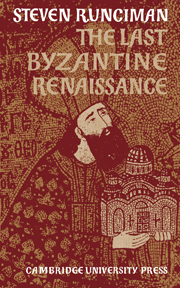4 - THE ACHIEVEMENTS OF THE RENAISSANCE
Summary
If scholars are men who study seriously and reflect upon their studies and seek to make deductions from them, then these Byzantine intellectuals were scholars. But what did their scholarship achieve? Did they add anything of value to the sum of human knowledge and understanding?
For the results of learning to be effective, they have to be transmitted, not only to the scholars' immediate circle but in such a way that they can have meaning for posterity. Herein the late Byzantine scholars were unlucky. They were living in the declining years of a civilization. In a short time Byzantium would perish and the Greeks become second-class citizens. The language in which they wrote was understood by few of their contemporaries outside the shrinking Greek world. By the time that Greek philology was studied in the Western countries with which the future lay, Byzantium had disappeared and its scholars were dispersed or dead. And, with the wealth of ancient Greek literature and thought made available to them, Western scholars were uninterested in what the later Greeks might have had to say, unless it was closely relevant to the Classical past. Moreover, what the later Greeks had to say in general was restricted by their distinction between the Inner and the Outer Learning. The Inner Learning dealt with eternity, with truths that had existed before the beginning of time; and man could only know what God in His goodness had chosen to reveal. The rest was unknown and unknowable. The student of the Inner Learning might be able to expound and explain these revealed truths, but he could not add to them unless the Holy Spirit vouchsafed further revelations.
- Type
- Chapter
- Information
- The Last Byzantine Renaissance , pp. 85 - 104Publisher: Cambridge University PressPrint publication year: 1970

